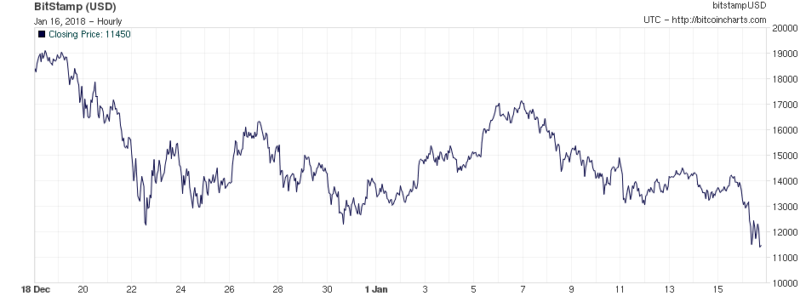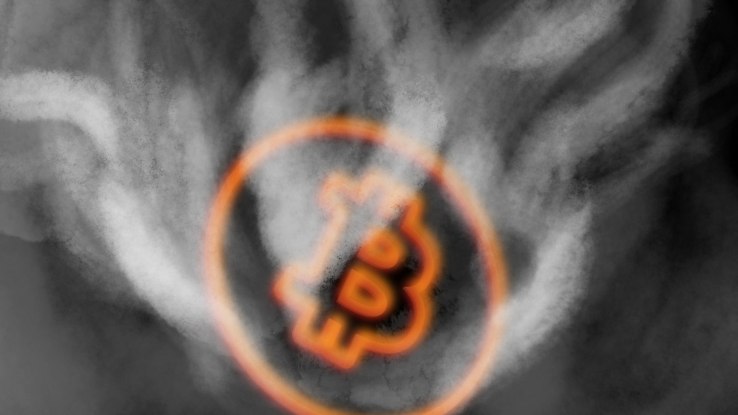Every major cryptocurrency has seen double-digit losses in the last 24 hours.

Bitcoin's fall was part of a broader crypto-currency selloff. Every major cryptocurrency has suffered double-digit losses over the last 24 hours, according to CoinMarketCap. Ethereum is down 21 percent. Bitcoin Cash is down 25 percent. Litecoin is down 20 percent, while Dash is down 21 percent, and Monero is down 25 percent.
It's hard to say what causes cryptocurrencies to go up or down on any given day. In recent months, Bitcoin and other cryptocurrencies have exhibited classic signs of a speculative bubble, with millions of ordinary investors flooding into the market in hopes of making an easy buck. That helped to push Bitcoin to new heights, but it also heightened the cryptocurrency's already significant volatility.
As a result, it has become common for particular cryptocurrencies to get "hot" and see their value soar for no apparent reason. It also means that crashes can become self-perpetuating, as inexperienced investors react by panic-selling, pushing the value down further.
While Bitcoin is down 42 percent from its December peak, Ethereum is still on an upward trajectory since the start of the year. The price of ether, Ethereum's currency, rose from $750 at the start of 2018 to a high of $1,400 over the weekend. The current price of $1,030 is down from that Saturday high but still way up from its value at any point prior to this year.
Is Global Front on Bitcoin Regulation Possible?

Analysis
On a day where confusing news continues to emanate from South Korea and China on new proposed bans and restrictions on Bitcoin, a member of the board of Germany’s Bundesbank has called for a united global regulatory front.
Joachim Wuermeling of Bundesbank
believes there is very little chance of containing this digital global
phenomenon with differing national rules across the globe. With
international co-operation in regulating Bitcoin comes a chance for
regulators to take control, says Wuermeling.
The effect of regulation
There has been increased regulatory pressure
on Bitcoin and the entire cryptocurrency market recently, which has
been felt across the board. The confusion that began in Korea caused a
major dip, and even the retraction of those statements helped the market grow.
Within
these regulatory moves, from individual national countries, there are
often powerful moves seen across the entire global cryptocurrency
market. However, they are never really big enough to bring it under full control.
These
are case-by-case regulations, and these instances are not strong enough
on their own for the free running cryptomarket to be constrained by.
“Effective
regulation of virtual currencies would therefore only be achievable
through the greatest possible international cooperation because the
regulatory power of nation states is obviously limited,” Wuermeling said.
Two sides to the digital coin
The issue is that there are two very different views to regulating Bitcoin, and these views can differ from country to country.
Japan is one of the strongest supporters of the digital currency market, giving Bitcoin currency status last year. However, just across the Sea of Japan, on the mainland, China has been the lead actor in the war against Bitcoin.
First there was the ICO ban, then the ban on exchanges, and now there is more bad news for those who even deal in exchange-like services.
It
is hard to find an agreeable position on digital currencies for nations
with so many torn between different ends of the scale. This is one of
the reasons why regulation is so difficult.
Is it needed?
There
is also the discussion of the need for regulation as it seemingly flies
in the face of what Bitcoin is trying to accomplish with its
decentralized nature. Cal Evans, an International Technology Lawyer from
London, says:
“As the cryptocurrency “grows up” it has had to overcome some serious compliance and regulatory problems internationally. These regulatory issues are numerous in nature depending on which country you read this in. Yet one problem seems to slip under the radar time and time again. Money Laundering.”
Adding to the devious nature, an unregulated currency brings London’s Kingston University economics professor Steve Keen echoes similar sentiments.
“You can’t be deregulated in a system where there will be criminal attacks. The code itself is clearly not foolproof. People will find their way in, forks will be forced upon them, whether they want them or not. In that situation, regulation may be the only future.”
Is it possible?
It
is clear that Bitcoin and other cryptocurrencies will continue to exist
in ways that many regulators disapprove of unless there is a united
front on wresting the digital currency economy under global control.
Even
banning the stuff in countries in China has only proved to be a speed
bump in the road, Bitcoiners, and the likes can always find a way.
Researchers find that one person likely drove Bitcoin from $150 to $1,000

Researchers Neil Gandal, JT Hamrick, Tyler Moore, and Tali Oberman have written a fascinating paper on Bitcoin price manipulation. Entitled “Price Manipulation in the Bitcoin Ecosystem” and appearing in the recent issue of the Journal of Monetary Economics the paper describes to what degree the Bitcoin ecosystem is controlled by bad actors.
To many it’s been obvious that the Bitcoin markets are, at the very
least, being manipulated by one or two big players. “This paper
identifies and analyzes the impact of suspicious trading activity on the
Mt. Gox Bitcoin currency exchange, in which approximately 600,000
bitcoins (BTC) valued at $188 million were fraudulently acquired,” the
researchers wrote. “During both periods, the USD-BTC exchange rate rose
by an average of four percent on days when suspicious trades took place,
compared to a slight decline on days without suspicious activity. Based
on rigorous analysis with extensive robustness checks, the paper
demonstrates that the suspicious trading activity likely caused the
unprecedented spike in the USD-BTC exchange rate in late 2013, when the
rate jumped from around $150 to more than $1,000 in two months.”The team found that many instances of price manipulation happened simply because the market was very thin for various cryptocurrencies including early Bitcoin. “Despite the huge increase in market capitalization, similar to the bitcoin market in 2013 (the period examined), markets for these other cryptocurrencies are very thin. The number of cryptocurrencies has increased from approximately 80 during the period examined to 843 today! Many of these markets are thin and subject to price manipulation.”
The manipulation happened primarily via two bots, Markus and Willy, that seemed to be performing valid trades but did not actually own the bitcoin they were using. During the Mt. Gox hack a number of these bots were able to create fake trades and make off with millions while manipulating the price of BTC.
The publicly reported trading volume at Mt. Gox included the fraudulent transactions, thereby signaling to the market that heavy trading activity was taking place. Indeed, the paper later shows that even if the fraudulent activity is set aside, average trading volume on all major exchanges trading bitcoins and USD was much higher on days the bots were active. The associated increase in “non-bot” trading was, of course, profitable for Mt. Gox, since it collected transaction fees.The bottom line is simple: if Bitcoin wants to be taken seriously it probably shouldn’t be this easy or legal to manipulate the markets. While decentralization is supposed to replace regulation it’s clear that there is still a way to go before it can be truly taken seriously. “As mainstream finance invests in cryptocurrency assets and as countries take steps toward legalizing bitcoin as a payment system (as Japan did in April 2017), it is important to understand how susceptible cryptocurrency markets are to manipulation. Our study provides a first examination,” write the researchers.
But the Willy Bot likely served another purpose as well. A theory, initially espoused in a Reddit post shortly after Mt. Gox’s collapse (Anonymous, 2014b), is that hackers stole a huge number (approximately 650,000) of bitcoins from Mt. Gox in June 2011 and that the exchange owner Mark Karpales took extraordinary steps to cover up the loss for several years.
